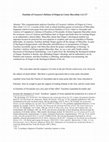Books by Mark DelCogliano
This is the Table of Contents for Volumes 3 and 4 of the Cambridge Edition of Early Christian Wri... more This is the Table of Contents for Volumes 3 and 4 of the Cambridge Edition of Early Christian Writings, entitled "Christ: Through the Nestorian Controversy" and "Christ: Chalcedon and Beyond." Edited by Mark DelCogliano. Forthcoming from Cambridge University Press.

"Basil of Caesarea’s debate with Eunomius of Cyzicus in the early 360s marks a turning point in t... more "Basil of Caesarea’s debate with Eunomius of Cyzicus in the early 360s marks a turning point in the fourth-century Trinitarian controversies. It shifted focus to methodological and epistemological disputes underlying theological differences. This monograph explores one of these fundamental points of contention: the proper theory of names. It offers a revisionist interpretation of Eunomius’s theory as a corrective to previous approaches, contesting the widespread assumption that it is indebted to Platonist sources and showing that it was developed by drawing upon proximate Christian sources. While Eunomius held that names uniquely predicated of God communicated the divine essence, in response Basil developed a “notionalist” theory wherein all names signify primarily notions and secondarily properties, not essence.
This book offers a revisionist interpretation of the fourth-century debate between the theologians Basil of Caesarea and Eunomius of Cyzicus by situating their rival theories of names in their proper historical, philosophical, and theological context."
Saint Basil of Caesarea (c. 329-378/9 CE) was a monk, bishop, preacher, theologian, and social ac... more Saint Basil of Caesarea (c. 329-378/9 CE) was a monk, bishop, preacher, theologian, and social activist who had very down-to-earth views about eating, drinking, fasting, and feasts in honor of local martyrs. In this new collection of sermon translations—most offered here in English for the first time— Basil addresses such issues as drunkenness, hesitations over baptism, community benefits of fasting, how to be thankful when facing loss and disaster, and the mystery of the incarnation. Also included are three sermons on local martyrs Julitta, Mamas, and Barlaam. This small volume of elegant translations will be a vital and valued resource for anyone interested in religion and the body, early Christian spiritual disciplines, and their application to the Church today.

As a priest and then bishop, Basil of Caesarea devoted sophisticated treatises to the Trinity and... more As a priest and then bishop, Basil of Caesarea devoted sophisticated treatises to the Trinity and to articulating his vision of the Christian life. In his homilies Basil distilled the best of his moral and theological teachings into forms readily accessible to his flock – and now to us. During his lifetime, Basil was recognized as one of the foremost rhetoricians of his day – a man supremely skilled in the art of speaking, instructing, persuading, and delighting at the same time. These rhetorical skills are on full display in the eleven Moral Homilies translated in this volume, seven of which appear in English for the first time.
The following homilies are included in this volume:
Fide (Hom. 15) De fide (On Faith)
Hum (Hom. 20) De humilitate (On Humility)
Inv (Hom. 11) De invidia (On Envy)
Lak (Hom. 26) Dicta in Lakizis (Delivered in Lakizois)
Mund (Hom. 21) Quod rebus mundanis adhaerendum non sit (On Detachment from Worldly Things, and on the Fire that Occurred Outside the Church)
Prov (Hom. 12) In principium Proverbiorum (On the Beginning of Proverbs)
Ps14a In Psalmum xiv A (On Psalm 14 I)
Ps115 In Psalmum cxv (On Psalm 115)
Sab (Hom. 24) Contra Sabellianos, et Arium, et Anomoeos (Against the Sabellians, Anomoians, and Pneumatomachians)
Trin (Hom. 29) Adversus eos qui per calumniam dicunt dici a nobis deos tres (On Not Three Gods, against those who calumniate us, claiming that we say that there are three gods)
Verb (Hom. 16) In illud, In principio erat Verbum (On the Beginning of the Gospel of John)

"Gregory the Great (+604) was a master of the art of exegesis. His interpretations are theologica... more "Gregory the Great (+604) was a master of the art of exegesis. His interpretations are theologically profound, methodologically fascinating, and historically influential. Nowhere is this more clearly seen than in his exegesis of the Song of Songs. Gregory’s interpretation of this popular Old Testament book not only owes much to Christian exegetes who preceded him, such as Origen, but also profoundly influenced later Western Latin exegetes, such as Bernard of Clairvaux.
This volume includes all that Gregory had to say on the Song of Songs. This includes his Exposition on the Song of Songs, as well as the florilegia compiled by Paterius (Gregory’s secretary) and the Venerable Bede, and, finally, William of Saint Thierry’s Excerpts from the Books of Blessed Gregory on the Song of Songs. It is now the key resource for reading and studying Gregory’s interpretation of the Song of Songs. "
"In the second half of the fourth century the mystery of the Holy Spirit was the subject of fierc... more "In the second half of the fourth century the mystery of the Holy Spirit was the subject of fierce debate. Those who fought against the Nicene Creed opposed the idea that the Spirit was God. Even some of those willing to accept the equality of the Father and the Son saw the Spirit as more angelic than divine.
The first great testament to the Spirit's divinity -showing how the Spirit creates and saves inseparably with the Father and the son- is St. Athanasius' Letters to Serapion. Only a few years later, Didymus the Blind penned his own On the Holy Spirit, which is here translated into English for the first time. For Didymus, the Spirit transforms Christians by drawing them into the divine life itself, and must therefore be one with the Father and Son.
This volume offers new translations of two of the most powerful Patristic reflections on the work and nature of the Holy Spirit."

"Basil of Caesarea is considered one of the architects of the Pro-Nicene Trinitarian doctrine ado... more "Basil of Caesarea is considered one of the architects of the Pro-Nicene Trinitarian doctrine adopted at the Council of Constantinople in 381, which eastern and western Christians to this day profess as "orthodox." Nowhere is his Trinitarian theology more clearly expressed than in his first major doctrinal work, Against Eunomius, finished in 364 or 365 CE. Responding to Eunomius, whose Apology gave renewed impetus to a tradition of starkly subordinationist Trinitarian theology that would survive for decades, Basil's Against Eunomius reflects the intense controversy raging at that time among Christians across the Mediterranean world over who God is.
In this treatise, Basil attempts to articulate a theology both of God's unitary essence and of the distinctive features that characterize the Father, Son, and Holy Spirit--a distinction that some hail as the cornerstone of "Cappadocian" theology. In Against Eunomius, we see the clash not simply of two dogmatic positions on the doctrine of the Trinity, but of two fundamentally opposed theological methods. Basil's treatise is as much about how theology ought to be done and what human beings can and cannot know about God as it is about the exposition of Trinitarian doctrine. Thus Against Eunomius marks a turning point in the Trinitarian debates of the fourth century, for the first time addressing the methodological and epistemological differences that gave rise to theological differences. Amidst the polemical vitriol of Against Eunomius is a call to epistemological humility on the part of the theologian, a call to recognize the limitations of even the best theology.
While Basil refined his theology through the course of his career, Against Eunomius remains a testament to his early theological development and a privileged window into the Trinitarian controversies of the mid-fourth century."
Papers by Mark DelCogliano

The Journal of Ecclesiastical History
In the De decretis Athanasius claims that Arius ‘copied’ and ‘learned’ from Asterius. This study ... more In the De decretis Athanasius claims that Arius ‘copied’ and ‘learned’ from Asterius. This study explores how this could have happened by arguing that in the writing of his Thalia Arius was influenced by Asterius’ Syntagmation. Besides complicating the literary and theological relationship between Arius and Asterius, this reconstruction provides the clearest evidence for the new perspective on Arius which has emerged in recent revisionist scholarship, and which argues that he is best understood as embedded within a theological tradition and as a catalysing participant in its efforts to articulate a theological vision. By dating the Syntagmation to about 322 and the Thalia to about 323 this study also gives qualified support to Rowan Williams's dating of some pre-Nicene events and discredits a recent attempt to position Asterius as having had a formative influence on Arius.

Origeniana Duodecima: Origen’s Legacy in the Holy Land–A Tale of Three Cities: Jerusalem, Caesarea, and Bethlehem. Proceedings from the 12th International Origen Conference, Jerusalem, 25-29 June, 2017, 2019
“Eusebius of Caesarea’s Defense of Origen in Contra Marcellum 1.4.1-27,” in B. Bitton-Ashkelony, ... more “Eusebius of Caesarea’s Defense of Origen in Contra Marcellum 1.4.1-27,” in B. Bitton-Ashkelony, O. Irshai, A. Kofsky, H. Newman, and L. Perrone (eds.), Origeniana Duodecima: Origen’s Legacy in the Holy Land–A Tale of Three Cities: Jerusalem, Caesarea, and Bethlehem. Proceedings from the 12th International Origen Conference, Jerusalem, 25-29 June, 2017, Bibliotheca Ephemeridum Theologicarum Lovaniensium, 302 (Leuven: Peeters, 2019), 297-308.
[A pre-publication version of the paper appears here; write to the author for the final version.]
Abstract: This communication analyzes Eusebius of Caesarea’s defense of Origen in Contra Marcellum 1.4.1-27, a section of the work in which Eusebius quotes several texts of Marcellus, fragments which in turn quote from and criticize Paulinus of Tyre’s letter to Alexander and Asterius of Cappadocia’s defense of Eusebius of Nicomedia. In these fragments Marcellus traces the erroneous views of Asterius and Paulinus back to Origen and faults them for treating Origen as an authoritative church father. Marcellus claims that Origen’s theological method was improper because he preferred his own opinions to scripture and was too beholden to Platonic philosophy. In response, Eusebius defends Origen against all the charges of Marcellus. In spite of theological disagreements with Marcellus and differences in interpretation of Origen, Eusebius essentially agrees with Marcellus about the proper methodology in theology. In Eusebius’s defense of Origen against Marcellus, then, we see a rare early fourth-century discussion of theological methodology, even if quite brief. By defending the theological method of Origen, Eusebius is thereby also defending Origen’s theology and its authoritative use by Paulinus and Asterius, and thus Eusebius is affirming, and perhaps even promoting, the continued use of Origen in the theological debates of his era.

Sacris Erudiri, 2017
One striking feature of Basil of Caesarea’s homily On Psalm 115 is that it lacks the thematic uni... more One striking feature of Basil of Caesarea’s homily On Psalm 115 is that it lacks the thematic unity found elsewhere in his homiletic corpus, even in his other fourteen homilies on various psalms, in which Basil manages to present a cohesive teaching in spite of his similar use of the verse-by-verse exegetical method. This study demonstrates that the frequent changes of subject which characterize this homily are the consequence of Basil drawing upon Origen’s disjointed comments upon Psalm 115 and combining them with an anti-Eunomian polemic. Origen’s interpretation of Psalm 115 is reconstructed chiefly on the basis of his scattered interpretations of selected verses from the psalm in his works, but also from the exegetical fragments attributed to him in the catena. A third source is used as well, Jerome’s Tractatus on Psalm 115, which, like all his tractates on the psalms, are widely seen as Latin adaptations of authentic homilies of Origen. In his exegesis of most of the verses of Psalm 115 Basil has borrowed from Origen but not without modifications and additions according to his own lights. In particular, Basil used Origen’s anti-philosophical polemic in his interpretation of Psalm 155:1-2 to develop an attack on the theological methodology of his opponent, Eunomius. On Psalm 115 thus contains a unique polemical construction of Eunomius on the part of Basil that complements the presentation of opponent in other works such as the Contra Eunomium. Therefore, this homily is a fine example of Basil deploying his sources from the tradition to meet contemporary challenges.

Studies in Late Antiquity, 2017
The precise date of the Council of Serdica is so important because it is essential for establishi... more The precise date of the Council of Serdica is so important because it is essential for establishing the chronology of numerous events in fourth-century Christianity, and thus for reconstructing its overall history and developments. Unfortunately, this date has been under debate for nearly two centuries. Traditionally, the council was dated to 347 C.E., but discoveries in the 18 th and 19 th centuries led scholars to favor first 344 and then 343. In the early 20 th century, Eduard Schwartz inaugurated a new stage in the debate when he argued for 342. In his wake, most French, Italian, and English-speaking scholars argued for 343, whereas most German-speaking scholars followed Schwartz's authority and endorsed 342. In 1974, Marcel Richard advanced a novel argument in favor in 342 that appeared to cement this date for its advocates. Recently, however , 343 appears to be the preferred date even in German scholarship. After more than a century of debate, it seems, a consensus has been reached. This essay offers the most comprehensive re-assessment of this debate to date to see if it really should be considered concluded. It reexamines all the evidence and all the arguments made in support of one date or another, in particular those of Schwartz and Richard, and argues that the case for the Council of Serdica's having been held in the autumn of 343 should be considered conclusive; thus, the lengthy debate can rightly be closed.

DOI: https://doi.org/10.1017/S0022046917000677
In the De decretis Athanasius claims that Arius... more DOI: https://doi.org/10.1017/S0022046917000677
In the De decretis Athanasius claims that Arius ‘copied’ and ‘learned’ from Asterius. This study explores how this could have happened by arguing that in the writing of his Thalia Arius was influenced by Asterius’ Syntagmation. Besides complicating the literary and theological relationship between Arius and Asterius, this reconstruction provides the clearest evidence for the new perspective on Arius which has emerged in recent revisionist scholarship, and which argues that he is best understood as embedded within a theological tradition and as a catalysing participant in its efforts to articulate a theological vision. By dating the Syntagmation to about 322 and the Thalia to about 323 this study also gives qualified support to Rowan Williams's dating of some pre-Nicene events and discredits a recent attempt to position Asterius as having had a formative influence on Arius.

This article surveys the reception of the biblical figure Phinehas the Zealot in Greek Christiani... more This article surveys the reception of the biblical figure Phinehas the Zealot in Greek Christianity through the fourth century. It reveals that the Cappadocians had unprecedented interest in Phinehas when compared with their Christian forbears, adopting a favorable view of him that has more in common with Philo than Origen. Of particular importance is the deployment of the figure of Phinehas in anti-Eunomian contexts by Basil of Caesarea, as well his brothers Gregory of Nyssa and Peter of Sebasteia, who accepted not only Basil’s self-presentation as a
kind of zealous Phinehas motivated by righteous anger, but also his depiction of Eunomius as a fornicator who was a deserving target of rhetorical violence. Yet each also modified Basil’s depictions in their own way to suit their own purposes. Accordingly, Basil not only exercised
a theological influence over his brothers, but shaped the polemical categories by which they understood the controversy with Eunomius. For the Cappadocians, the anti-Eunomian defender of orthodoxy is a new Phinehas.
“The Politics of Fasting in Basil of Caesarea,” in Daniel McClain and Matt Tapie (eds.), Reading ... more “The Politics of Fasting in Basil of Caesarea,” in Daniel McClain and Matt Tapie (eds.), Reading Scripture as a Political Act: Essays on the Theopolitical Interpretation of the Bible (Minneapolis: Fortress Press, 2015), 83–100.
"Asterius in Athanasius' Catalogues of Arian Views," Journal of Theological Studies n.s. 66 (2015... more "Asterius in Athanasius' Catalogues of Arian Views," Journal of Theological Studies n.s. 66 (2015): 625-650.
"A Fresh Look at William of St. Thierry’s Excerpts from the Books of Blessed Ambrose on the Song ... more "A Fresh Look at William of St. Thierry’s Excerpts from the Books of Blessed Ambrose on the Song of Songs," in F. Tyler Sergent, Aage Rydstrøm-Poulsen, and Marsha L. Dutton (eds.), Unity of Spirit: Studies on William of Saint-Thierry in Honor of E. Rozanne Elder, Cistercian Studies Series 286 (Collegeville: Liturgical Press, 2015), 37–59. [pre-publication version]

This paper investigates rival views about the nature of time that were articulated in the fourth-... more This paper investigates rival views about the nature of time that were articulated in the fourth-century Christian controversies over the Trinity. In his Contra Eunomium Basil of Caesarea refuted the definition of time put forward by his opponent, Eunomius of Cyzicus, and presented his own views on its nature. This study seeks to contextualize the views of both contestants polemically, theologically, and philosophically. It is argued that Eunomius’s definition of time has a Platonic pedigree. In addition, it is demonstrated that, in both his critique of Eunomius’s definition and the positive presentation of his own views on time, Basil draws upon his familiarity with the philosophical critique of Plato’s views, as found in Aristotle, the Peripatetics, the Stoics, and the Middle Platonists (and perhaps even Galen). Basil’s own views on time have been most immediately influenced by Middle Platonist, Peripatetic, and Stoic concerns.










Uploads
Books by Mark DelCogliano
This book offers a revisionist interpretation of the fourth-century debate between the theologians Basil of Caesarea and Eunomius of Cyzicus by situating their rival theories of names in their proper historical, philosophical, and theological context."
The following homilies are included in this volume:
Fide (Hom. 15) De fide (On Faith)
Hum (Hom. 20) De humilitate (On Humility)
Inv (Hom. 11) De invidia (On Envy)
Lak (Hom. 26) Dicta in Lakizis (Delivered in Lakizois)
Mund (Hom. 21) Quod rebus mundanis adhaerendum non sit (On Detachment from Worldly Things, and on the Fire that Occurred Outside the Church)
Prov (Hom. 12) In principium Proverbiorum (On the Beginning of Proverbs)
Ps14a In Psalmum xiv A (On Psalm 14 I)
Ps115 In Psalmum cxv (On Psalm 115)
Sab (Hom. 24) Contra Sabellianos, et Arium, et Anomoeos (Against the Sabellians, Anomoians, and Pneumatomachians)
Trin (Hom. 29) Adversus eos qui per calumniam dicunt dici a nobis deos tres (On Not Three Gods, against those who calumniate us, claiming that we say that there are three gods)
Verb (Hom. 16) In illud, In principio erat Verbum (On the Beginning of the Gospel of John)
This volume includes all that Gregory had to say on the Song of Songs. This includes his Exposition on the Song of Songs, as well as the florilegia compiled by Paterius (Gregory’s secretary) and the Venerable Bede, and, finally, William of Saint Thierry’s Excerpts from the Books of Blessed Gregory on the Song of Songs. It is now the key resource for reading and studying Gregory’s interpretation of the Song of Songs. "
The first great testament to the Spirit's divinity -showing how the Spirit creates and saves inseparably with the Father and the son- is St. Athanasius' Letters to Serapion. Only a few years later, Didymus the Blind penned his own On the Holy Spirit, which is here translated into English for the first time. For Didymus, the Spirit transforms Christians by drawing them into the divine life itself, and must therefore be one with the Father and Son.
This volume offers new translations of two of the most powerful Patristic reflections on the work and nature of the Holy Spirit."
In this treatise, Basil attempts to articulate a theology both of God's unitary essence and of the distinctive features that characterize the Father, Son, and Holy Spirit--a distinction that some hail as the cornerstone of "Cappadocian" theology. In Against Eunomius, we see the clash not simply of two dogmatic positions on the doctrine of the Trinity, but of two fundamentally opposed theological methods. Basil's treatise is as much about how theology ought to be done and what human beings can and cannot know about God as it is about the exposition of Trinitarian doctrine. Thus Against Eunomius marks a turning point in the Trinitarian debates of the fourth century, for the first time addressing the methodological and epistemological differences that gave rise to theological differences. Amidst the polemical vitriol of Against Eunomius is a call to epistemological humility on the part of the theologian, a call to recognize the limitations of even the best theology.
While Basil refined his theology through the course of his career, Against Eunomius remains a testament to his early theological development and a privileged window into the Trinitarian controversies of the mid-fourth century."
Papers by Mark DelCogliano
[A pre-publication version of the paper appears here; write to the author for the final version.]
Abstract: This communication analyzes Eusebius of Caesarea’s defense of Origen in Contra Marcellum 1.4.1-27, a section of the work in which Eusebius quotes several texts of Marcellus, fragments which in turn quote from and criticize Paulinus of Tyre’s letter to Alexander and Asterius of Cappadocia’s defense of Eusebius of Nicomedia. In these fragments Marcellus traces the erroneous views of Asterius and Paulinus back to Origen and faults them for treating Origen as an authoritative church father. Marcellus claims that Origen’s theological method was improper because he preferred his own opinions to scripture and was too beholden to Platonic philosophy. In response, Eusebius defends Origen against all the charges of Marcellus. In spite of theological disagreements with Marcellus and differences in interpretation of Origen, Eusebius essentially agrees with Marcellus about the proper methodology in theology. In Eusebius’s defense of Origen against Marcellus, then, we see a rare early fourth-century discussion of theological methodology, even if quite brief. By defending the theological method of Origen, Eusebius is thereby also defending Origen’s theology and its authoritative use by Paulinus and Asterius, and thus Eusebius is affirming, and perhaps even promoting, the continued use of Origen in the theological debates of his era.
In the De decretis Athanasius claims that Arius ‘copied’ and ‘learned’ from Asterius. This study explores how this could have happened by arguing that in the writing of his Thalia Arius was influenced by Asterius’ Syntagmation. Besides complicating the literary and theological relationship between Arius and Asterius, this reconstruction provides the clearest evidence for the new perspective on Arius which has emerged in recent revisionist scholarship, and which argues that he is best understood as embedded within a theological tradition and as a catalysing participant in its efforts to articulate a theological vision. By dating the Syntagmation to about 322 and the Thalia to about 323 this study also gives qualified support to Rowan Williams's dating of some pre-Nicene events and discredits a recent attempt to position Asterius as having had a formative influence on Arius.
kind of zealous Phinehas motivated by righteous anger, but also his depiction of Eunomius as a fornicator who was a deserving target of rhetorical violence. Yet each also modified Basil’s depictions in their own way to suit their own purposes. Accordingly, Basil not only exercised
a theological influence over his brothers, but shaped the polemical categories by which they understood the controversy with Eunomius. For the Cappadocians, the anti-Eunomian defender of orthodoxy is a new Phinehas.
This book offers a revisionist interpretation of the fourth-century debate between the theologians Basil of Caesarea and Eunomius of Cyzicus by situating their rival theories of names in their proper historical, philosophical, and theological context."
The following homilies are included in this volume:
Fide (Hom. 15) De fide (On Faith)
Hum (Hom. 20) De humilitate (On Humility)
Inv (Hom. 11) De invidia (On Envy)
Lak (Hom. 26) Dicta in Lakizis (Delivered in Lakizois)
Mund (Hom. 21) Quod rebus mundanis adhaerendum non sit (On Detachment from Worldly Things, and on the Fire that Occurred Outside the Church)
Prov (Hom. 12) In principium Proverbiorum (On the Beginning of Proverbs)
Ps14a In Psalmum xiv A (On Psalm 14 I)
Ps115 In Psalmum cxv (On Psalm 115)
Sab (Hom. 24) Contra Sabellianos, et Arium, et Anomoeos (Against the Sabellians, Anomoians, and Pneumatomachians)
Trin (Hom. 29) Adversus eos qui per calumniam dicunt dici a nobis deos tres (On Not Three Gods, against those who calumniate us, claiming that we say that there are three gods)
Verb (Hom. 16) In illud, In principio erat Verbum (On the Beginning of the Gospel of John)
This volume includes all that Gregory had to say on the Song of Songs. This includes his Exposition on the Song of Songs, as well as the florilegia compiled by Paterius (Gregory’s secretary) and the Venerable Bede, and, finally, William of Saint Thierry’s Excerpts from the Books of Blessed Gregory on the Song of Songs. It is now the key resource for reading and studying Gregory’s interpretation of the Song of Songs. "
The first great testament to the Spirit's divinity -showing how the Spirit creates and saves inseparably with the Father and the son- is St. Athanasius' Letters to Serapion. Only a few years later, Didymus the Blind penned his own On the Holy Spirit, which is here translated into English for the first time. For Didymus, the Spirit transforms Christians by drawing them into the divine life itself, and must therefore be one with the Father and Son.
This volume offers new translations of two of the most powerful Patristic reflections on the work and nature of the Holy Spirit."
In this treatise, Basil attempts to articulate a theology both of God's unitary essence and of the distinctive features that characterize the Father, Son, and Holy Spirit--a distinction that some hail as the cornerstone of "Cappadocian" theology. In Against Eunomius, we see the clash not simply of two dogmatic positions on the doctrine of the Trinity, but of two fundamentally opposed theological methods. Basil's treatise is as much about how theology ought to be done and what human beings can and cannot know about God as it is about the exposition of Trinitarian doctrine. Thus Against Eunomius marks a turning point in the Trinitarian debates of the fourth century, for the first time addressing the methodological and epistemological differences that gave rise to theological differences. Amidst the polemical vitriol of Against Eunomius is a call to epistemological humility on the part of the theologian, a call to recognize the limitations of even the best theology.
While Basil refined his theology through the course of his career, Against Eunomius remains a testament to his early theological development and a privileged window into the Trinitarian controversies of the mid-fourth century."
[A pre-publication version of the paper appears here; write to the author for the final version.]
Abstract: This communication analyzes Eusebius of Caesarea’s defense of Origen in Contra Marcellum 1.4.1-27, a section of the work in which Eusebius quotes several texts of Marcellus, fragments which in turn quote from and criticize Paulinus of Tyre’s letter to Alexander and Asterius of Cappadocia’s defense of Eusebius of Nicomedia. In these fragments Marcellus traces the erroneous views of Asterius and Paulinus back to Origen and faults them for treating Origen as an authoritative church father. Marcellus claims that Origen’s theological method was improper because he preferred his own opinions to scripture and was too beholden to Platonic philosophy. In response, Eusebius defends Origen against all the charges of Marcellus. In spite of theological disagreements with Marcellus and differences in interpretation of Origen, Eusebius essentially agrees with Marcellus about the proper methodology in theology. In Eusebius’s defense of Origen against Marcellus, then, we see a rare early fourth-century discussion of theological methodology, even if quite brief. By defending the theological method of Origen, Eusebius is thereby also defending Origen’s theology and its authoritative use by Paulinus and Asterius, and thus Eusebius is affirming, and perhaps even promoting, the continued use of Origen in the theological debates of his era.
In the De decretis Athanasius claims that Arius ‘copied’ and ‘learned’ from Asterius. This study explores how this could have happened by arguing that in the writing of his Thalia Arius was influenced by Asterius’ Syntagmation. Besides complicating the literary and theological relationship between Arius and Asterius, this reconstruction provides the clearest evidence for the new perspective on Arius which has emerged in recent revisionist scholarship, and which argues that he is best understood as embedded within a theological tradition and as a catalysing participant in its efforts to articulate a theological vision. By dating the Syntagmation to about 322 and the Thalia to about 323 this study also gives qualified support to Rowan Williams's dating of some pre-Nicene events and discredits a recent attempt to position Asterius as having had a formative influence on Arius.
kind of zealous Phinehas motivated by righteous anger, but also his depiction of Eunomius as a fornicator who was a deserving target of rhetorical violence. Yet each also modified Basil’s depictions in their own way to suit their own purposes. Accordingly, Basil not only exercised
a theological influence over his brothers, but shaped the polemical categories by which they understood the controversy with Eunomius. For the Cappadocians, the anti-Eunomian defender of orthodoxy is a new Phinehas.